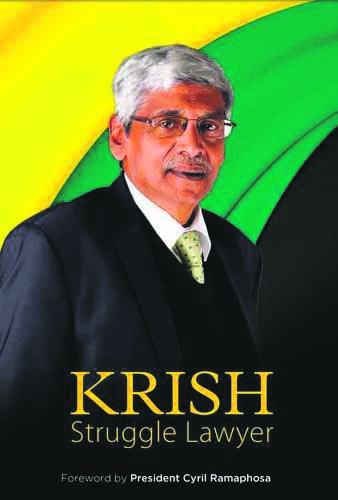
Krish: Struggle Lawyer by Krish Naidoo
Self-published (2019)
Distributed by Protea Publishers
306 pages
R267
The introduction to the book Krish: Struggle Lawyer reads: “Krish Naidoo practised as a human rights lawyer in Johannesburg, South Africa, in the 1980s.
This book records his life, the political trials he was involved in and his activities in sport, culture and the legal fraternity.”
While this is not inaccurate, it does not do justice to the incredibly rich and intricate tapestry that Naidoo weaves in this autobiography – bringing together people, life, law and struggle.
The book, whose foreword is by President Cyril Ramaphosa, is well written, accessible, educative, gripping and often entertaining while infused with a deep sense of humanity and humility.
Naidoo truly defies all the stereotypes that (often justifiably) cling to legal prose. He gives a compelling account of his own life and struggle as well as important eras and facets of our history.
He narrates his involvement in headline-making episodes in our struggle: the 1987 United Democratic Front advert calling for the unbanning of the ANC; Murphy Morobe, Valli Moosa and Vusi Khanyile’s 1987 escape from detention to the US consulate in Johannesburg; the 1987 Culture in Another South Africa conference in Amsterdam; the Convention for a Democratic South Africa negotiations and the Transitional Executive Council in 1993 as well as the more recent trials and tribulations of the SABC.
He also recounts the painful political trials that ended with the death penalty, the humanity and heroism of his comrades and clients: The Sasol Three; The Moroka Three; The Sharpeville Six; and the Upington 26.
While Naidoo recounts his own involvement and contributions, he does so with humility and ample generosity in recognising the role and contributions of others.
His accounts of the formation of the National Sports Congress, the Safa and the National Association of Democratic Lawyers are valuable, not only as contributions to our history, but also for their insights and lessons concerning the relationship between principle, strategy and tactics.
The richness and complexity of Naidoo’s life and character, and by extension the struggle he was such an integral part of, are demonstrated in the sophisticated understanding that he articulates regarding the interrelationship between culture, democracy, development and the national question.
In looking back, Naidoo also looks forward.
In the last chapter – Quo Vadis My Party, My Country – he expresses his confidence in the ability of the ANC to introspect and to self-correct. He characterises the ANC as “a thinking organisation” that has evolved and developed into a formidable, yet complex structure, marked by depth of thinking, far-sightedness and innovation, as well as self-criticism and correction.
Naidoo expresses both pain and frustration at the failure and betrayal by a number of public representatives as well as his confidence in the political will of the ANC to raise the bar of morality.
He does not shy away from making bold, and possibly controversial, proposals.
Naidoo proposes a waiver of the presumption of innocence in the case of public representatives. He also suggests that the grounds of ineligibility to stand for public office should be expanded to include people found guilty of fraud, corruption and crimes against women and children.
He also argues for a domestic asset repatriation programme to give public representatives and business corporations the opportunity to voluntarily declare their illicit wealth – essentially a truth and reconciliation commission for fraud, corruption and tax evasion.
Naidoo concludes: “I expect that we will spend the next few years restoring good governance, repairing our morality and reviving our growth path.
“But, in the end, I know and believe that hope will translate into new beginnings and will take us to new highs as a party, a society and as a nation.”
The book is a valuable contribution to a growing body of work on the role of law and the legal profession in our society.
- Nel is a member of the ANC national executive committee and the national working committee coordinator




 Publications
Publications
 Partners
Partners








